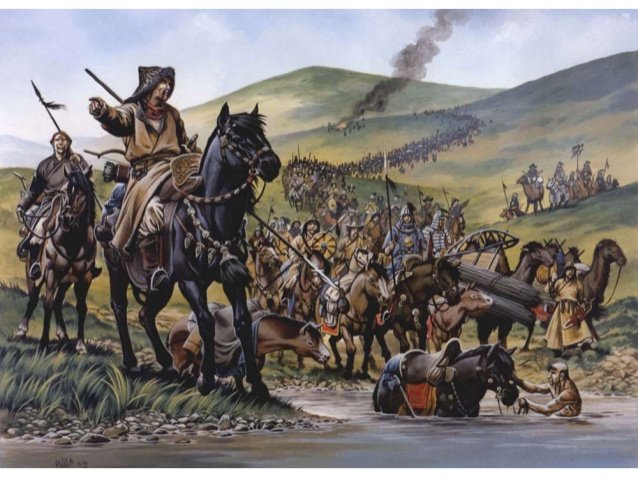The Mongol Empire (1206–1368 AD)
The largest contiguous land empire in history and the destroyers of a quarter of world population. That was an era when empires surrendered just by the name of Mongols.
How was such a small army able to conquer most of known world at that time?
Some of these tactics may seem obvious, but mind you, that was 13th century and Mongols were probably setting an example for the generations to follow:
The Mongols had the only major army in history consisting exclusively of cavalry. This provided them inexorable mobility (While playing Age of Empires if you prefer a all Paladin Army, you have Mongol blood :P). In the mechanized age of blitzkrieg in the 1940's in Europe, an advance of 30 miles in a day was considered near miraculous, and it couldn't be maintained. But the Mongols could move 50 miles per day and keep it up for weeks.
Each Mongol warrior would usually travel with multiple horses, allowing him to quickly switch to a fresh mount as needed. The horse is viewed much like a cow in Mongolia, and is milked and slaughtered for meat as such. Mongols could survive a whole month only by drinking mare's milk combined with mare's blood.
There was no such thing as a civilian population in Mongolia. War was a full job and either you were a soldier or somehow supported a soldier.
The Mongols used composite recurved bows which were far higher technology than the Welsh Longbow; unmatched in accuracy, force and reach (around 400m !!)
One of the most ruthless, yet efficient, parts of Genghis Khan’s reign was his brutal conquest of the Silk Road, the main trade route between Asia and Europe, and one of the largest (if not the absolute largest) sources of income for the Mongol empire.
During the initial states of battlefield contact, while camping in close proximity of their enemies at night, they would feign numerical superiority by ordering each soldier to light at least five fires, which would appear to the enemy scouts and spies that their force was almost five times larger than it actually was.
Opponent's Morale - Mongols inflated stories of their battlefield prowess to intimidate their opponents, and used other propaganda and pyrotechnics to break the opponent's morale before and during the battle. Even the present meaning of the word Horde in European languages 'to be a large overwhelming mass of people', rather than a 'small campsite' as it means in Mongol, is a continued result of such propaganda.
Another way the Mongols utilized deception and terror was by tying tree branches or leaves behind their horses and letting the foliage drag behind them across the ground; by traveling in a systematic fashion, the Mongols could create a dust storm behind hills, in order to create fear and appear to the enemy to be much larger than they actually were, thereby forcing the enemy to surrender.
Feigned Retreat - The Mongols very commonly practiced the feigned retreat, perhaps the most difficult battlefield tactic to execute. As the enemies came in pursuit of them, they would be ambushed and picked off one by one.
The Mongols carefully scouted out and spied on their enemies in advance of any invasion. Prior to the invasion of Europe, Batu(grand son of Genghis Khan) and Subutai(military strategist of Genghis Khan) sent spies for almost ten years into the heart of Europe, making maps of the old Roman roads, establishing trade routes, and determining the level of ability of each principality to resist invasion.
Unlike many of their foes, the Mongols also protected their ranking officers well. A General such as Subutai, unable to ride a horse in the later part of his career due to age and obesity, would have been ridiculed out of any European army of the time. But the Mongols recognized and respected his still-powerful military mind.
Siege machines were an important part of Genghis Khan's warfare, especially in attacking fortified cities. The siege engines were not disassembled and carried by horses to be rebuilt at the site of the battle like European armies. Instead the Mongol horde would travel with skilled engineers who would build siege engines from materials on site.
Survival - Here is where Mongols differed most drastically from other cultures such as Europe or Japan. Mongols placed high emphasis on surviving at all costs. There was no glorious defeat. There were no suicide troops, no unit was sent on a mission they would not be expected to survive. The only glory was in winning.
The Mongol Horde has long been vilified and misunderstood in the west. Even the name was chosen badly; the term horde suggests an armed mob with no internal organization which blindly attacks whatever is nearby, like a plague of locusts. The reality was much different. At the time that Genghis Khan lived, the army he created was in fact the most disciplined and well organized armed force in the world. It was an extraordinary force capable of accomplishing the impossible.
At last, one interesting fact to know-
When Mongol armies attacked, their spoils were shared among the troops and officers, with one exception. The most beautiful women were reserved for the Khan, and as a result -
"One in every 200 men alive today is a descendant of Genghis Khan." :)
welcome to steemit! @ullaslepakshi95. If you want to know something new then come @shagor0161.
Hi! I am a robot. I just upvoted you! I found similar content that readers might be interested in:
https://www.quora.com/What-are-the-most-mind-blowing-tricks-used-during-any-war
THANKS BRO